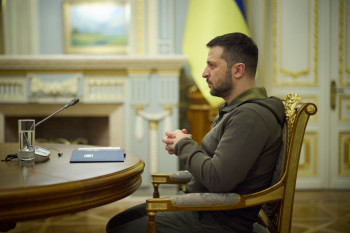Zelensky calls on West to allocate $843 million to support Ukraine’s critical infrastructure in winter
President Volodymyr Zelensky has called on allies to allocate additional aid to support Ukraine’s critical infrastructure this winter amid Russia’s continuous mass missile strikes.
“Such electricity supply support could cost around 800 million euros ($843 million) at current prices. This is significant. But significantly less than what a blackout in Ukraine could cost us all,” Zelensky said in a virtual address to the participants of the "In solidarity with the Ukrainian People" conference held in Paris on Dec. 13.
According to Zelensky, Ukraine needs various equipment such as transformers, gas turbines, gas piston power units, and equipment for restoring high-voltage networks. The country also requires support in purchasing about two billion cubic meters of gas.
Zelensky urged the European Union to send special observation missions to the critical infrastructure sites in Ukraine, “which are involved in the energy supply of Ukraine and on which the stability of our entire region directly depends.”
“And we need a special permanent mechanism for coordinating efforts — the Paris Mechanism. This will make it possible to provide timely and effective responses to every challenge of Russian energy terror,” Zelensky said.
Earlier on Dec. 12, Prime Minister Denys Shmyhal said Ukraine needs as much as $1 billion to restore critical infrastructure quickly to get through the winter.
Shmyhal also said that, by attacking Ukraine’s energy infrastructure, Russia is trying to “flood” the European Union with a new wave of refugees, noting that the strikes led to electricity and water supply outages that affected millions of Ukrainians amid freezing weather.
Shmyhal earlier warned of “significant” energy cuts this winter after Russia’s missile blitz damaged “all thermal and hydroelectric power plants” across the country.
Since Oct. 10, Moscow has unleashed six large-scale strikes targeting Ukraine’s energy sector, killing dozens of civilians and causing emergency blackouts across the country.
Russia has fired over 1,000 missiles and loitering munitions at energy infrastructure nationwide over the last two months, Volodymyr Kudrytsky, CEO of Ukraine’s state grid operator Ukrenergo, said on Dec. 9.
The most recent nationwide attack on Ukraine occurred on Dec. 5, killing four and hitting energy sites in at least three regions.










